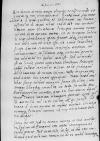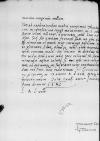Gratissimae fuerunt mihi superinscribed⌈mihimihi superinscribed⌉ ⌊⌋ Reverendissimae Dominationis Vestrae, quibus et salutavit me humanissime, et de novis rebus reddidi written over e⌈eii written over e⌉t me certiorem. Utinam vero Christiani principes animis reconciliatis dent operam mutuo, ut in tempore labenti rei publicae Christianae opem ferant idque cogitent rem nobis cum eo hoste esse, ex cuius faucibus, si ope divina communi consensu ereptam non curaverimus, in summum atque extremum periculum ms. adductam reg. adductum⌈adductamms. adductam reg. adductum⌉ iri dubium non est. Sed verendum est, ne serius, quam oporteat, Christiani principes saluti publicae consulere vellent, neve priusquam deliberaverint de rerum summa, hostis inopinantes, quod aiunt, nos omnes opprimat. Nam quod antehac facere solebat numquam, fama est ⌊illum⌋ cum coniuge liberisque omnibus ac tota familia sua ⌊Hadrianopolim⌋ venisse, quo ex loco decem dierum spatio in superinscribed⌈inin superinscribed⌉ ⌊Transyluaniam⌋ irrumpere poterit. Quid igitur ⌊illi⌋ animi sit, vel ex eo saltem colligi potest. Sed tamen Dominus Deus omnia in melius vertat Christianorumque principum animos ad rei publicae Christianae salutem dirigat.
Fama hic est, sed ea tamen incerta et sine auctore, ⌊Budam⌋ ab ⌊Hungaris⌋ esse captam strategematis quodam genere. Nos vero, etsi, ut fit, id ita esse credimus, quod volumus, tamen ea de re certum hucusque  BCz, 1599, p. 292 nuntium accepimus nullum.
BCz, 1599, p. 292 nuntium accepimus nullum.
Nos ab exploratoribus nostris accepimus ⌊Thartaros⌋ cum numerosissimis copiis adventare, ut
s(acrae) or s(renissimae)⌈s(acrae)s(acrae) or s(renissimae)⌉
⌊maiestati regiae⌋ bellum inferant dicionesque maiestatis suae vastent. Sed fit quodam fortasse fato, ut plus quam si written over es⌈essisi written over es⌉t commodum et quam rei publicae rationes postulant, in eo oscitantes simus planeque nihil, quae impendent nobis, curemus mala. Ita omnia in deterius ruunt. Nec video, quid brevi nobis spei reliquum sit futurum retinendae nostrae salutis, si nos ipsi non collegerimus ad optimasque ac salutares ⌊rei publicae⌋ cogitationes, dum res sinit, non redierimus etc.
Commendo me diligenter ac ex animo Reverendissimae Dominationi Vestrae optoque eam feliciter valere.
 BCz, 1599, p. 292 nuntium accepimus nullum.
BCz, 1599, p. 292 nuntium accepimus nullum.

